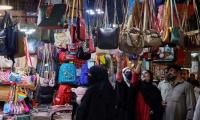KARACHI: Consumer inflation picked up at the fastest pace in nearly 8 years in November to 12.67 percent year-on-year on extraordinary high food prices, showing a breach in the central bank’s target range of 11-12 percent for the first time in the current fiscal year of 2019/20, official data showed on Wednesday.
Pakistan Bureau of Statistics (PBS) data showed that consumer inflation was recorded at 5.7 percent in November 2018. Consumer inflation increased 1.3 percent month-on-month in November 2019 compared to an increase of 1.8 percent in the previous month and a decrease of 0.1 percent in November 2018.
Prices of food, which carries highest weight in inflation metrics, surged 19.4 percent year-on-year in November 2019. While non-perishable food items saw 11.4 percent increase in prices, perishable foods witnessed around 70 percent year-on-year surge in prices in the previous month.
Prices of key products, including food and transport, were out of the range compared with the central bank’s annual target of 11 to 12 percent.
Consumer inflation beat the market consensus of 12.25 to 12.49 percent. The monthly reading has never reached to this level since January 2012, according to the PBS available data.
Analysts said a large jump in November inflation on rising food costs is a blow to the economy as fast rise in consumer prices slowed economic growth this fiscal year. But the government is expecting inflation to drop at the end of this month.
Tahir Abbas, deputy head of Research at Arif Habib said inflation “is likely to peak out in January”
“… so in next two months the number may stay on the higher side,” Abbas said. “Monetary easing cycle is expected from March onwards.”
Economist Ashfaque Hasan Khan, however, believes a surge in food prices suggested stubborn price pressures would keep inflation close or above to the central bank’s target ceiling in the near-term.
“Inflation is likely to be more than 13 percent in December, and the expected increase in inflation numbers would be based on a hike in energy prices, currency devaluation and high interest rates,” Khan said.
“Higher prices of imported items and raw materials due to the currency devaluation are being passed on to consumers. Companies are also passing on the higher costs of working capital amid increased interest rates to the consumers.”
Khan said the latest inflation data also confounded analysts’ expectations of an imminent easing cycle. “Any rate cut would be hard to justify because of higher inflation expectations.”
The central bank kept its benchmark interest rate unchanged at 13.25 percent in November, as expected, to prevent food inflation, nearing the top of its target range, from further spreading.
State Bank of Pakistan Governor Reza Baqir recently said rising inflation “has partly been the result of the need to restore competitiveness in the exchange rate, increased administered prices to reduce fiscal deficits in the public sector, and unforeseen food supply disruptions”.
PBS data showed that average consumer inflation for July-November clocked in at 10.8 percent compared with 6.07 percent in the corresponding period of 2018/19 and 4.56 percent in the same period of 2017/18.
The latest consumer inflation was the third reading since the revision of base year to 2015/16 from 2007/08. The new metrics breaks down consumer inflation as general, rural and urban. Under the old method, annual consumer inflation was recorded at 12.28 percent in November.
Consumer price index (CPI) inflation urban increased 12.1 percent year-on-year in November 2019 compared to an increase of 10.9 percent in the previous month and 6.3 percent in November 2018. On month-on-month basis, it increased 1 percent in November 2019 as compared to an increase of 1.6 percent in the previous month and a decrease of 0.1 percent in November 2018.
CPI inflation rural increased 13.6 percent year-on-year in November 2019 as compared to an increase of 11.3 percent in the previous month and 4.7 percent in November 2018. On month-on-month basis, it increased 1.9 percent in November 2019 as compared to an increase of 2.2 percent in the previous month and a decrease of 0.2 percent in November 2018.
A man drinks water from a cooler at a Pakistan State Oil petrol station in Peshawar, on October 2, 2017....
UBL building external view seen in this image. — Facebook@UBLUnitedBankLtd/FileKARACHI: Park View Enclave Limited...
Syngenta logo can be seen out side their office. — Syngenta website/FileKARACHI: Syngenta Pakistan, a leading...
Gold jewellery is displayed at a store in this undated file photo. — AFPKARACHI: Gold prices rose by Rs1,400 per...
A view shows the Trans Ocean Barents drilling rig. — Reuters/FileKARACHI: The Competition Commission of Pakistan ...
Sun-dried cocoa beans inside a warehouse in Assin Foso, Ghana, November 20, 2024. — ReutersLONDON: Behind a record...







